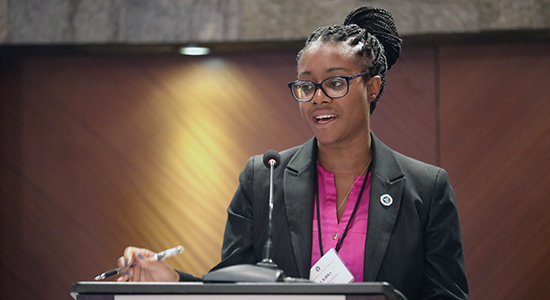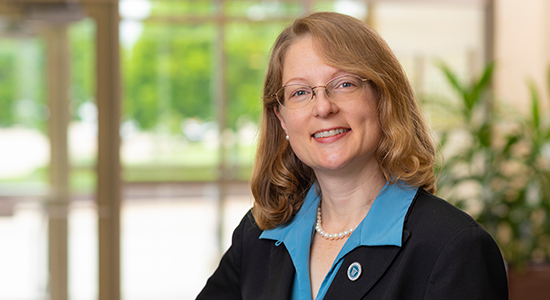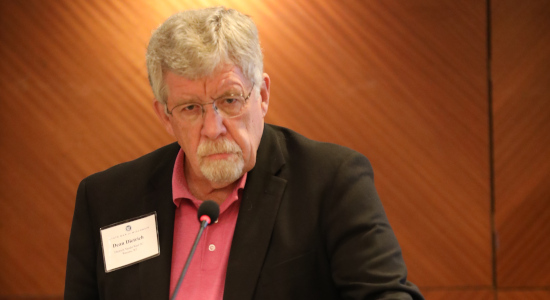
File Photo: Kori Ashley, chairperson of the State Bar of Wisconsin's Board of Governors. Ashley conducted her final board meeting as chair remotely. The meeting was supposed to coincide with the State Bar's Annual Meeting and Conference in Elkhart Lake, which was cancelled due to COVID-19. Ashley was recently appointed as a judge for the Milwaukee County Circuit Court.
June 11, 2020 – What can the State Bar of Wisconsin do to combat racial injustice, advance equal justice, and promote diversity and inclusion? The State Bar’s Board of Governors discussed the question yesterday at its last meeting of the fiscal year.
The discussion follows the tragic death of George Floyd on May 25 while a Minneapolis police officer pressed his knee against Floyd’s neck for nearly nine minutes.
This instance of police brutality was just one of many, but the graphic video sparked outrage and massive nationwide protests against systemic racism and injustice. Those protests continue in Wisconsin, nationwide, and in other countries.
From advocacy and grassroots work to leadership development, the State Bar has been engaging on matters of race and inequality that plague the justice system and the legal profession for the last several years. But recent events highlight the imperative of doing more.
“This has been a trying few weeks, not just for myself but for many folks on the board, many people of color, and I understand that there is a desire to express frustration,” said Board Chair Kori Ashley. Ashley is an attorney at Legal Action of Wisconsin in Milwaukee and was recently appointed circuit court judge for Milwaukee County.
Reopening the Courts
Judge Randy Koschnick, Director of Wisconsin State Courts, addressed the board to explain the state court’s system’s reopening plan. If you missed it, Judge Koschnick explains the reopening plan in a recent interview for InsideTrack. Watch now.
“It’s my job to make sure that we have a productive conversation that allows us to talk about solutions and things that are actionable,” said Ashley, noting the discussion is just the first step in developing concrete solutions that the State Bar can effectively pursue.
Moving Forward
The State Bar’s policy priorities continue to focus on criminal justice matters, including key issues like expungement, juvenile shackling, bail reform, juvenile jurisdiction (17 year olds), and access to public defenders. The State Bar also advocates for adequate civil legal aid funding to provide representation to indigent individuals and families.
In addition, the State Bar has spearheaded efforts on particular issues that require radical systemic change, such as mass and disparate incarceration in Wisconsin.
And the State Bar’s ongoing diversity and inclusion efforts have resulted in more diversity among State Bar leadership positions, a major priority with the State Bar’s standing Diversity and Inclusion Oversight Committee (DIOC). But board members recognized that greater member engagement and more aggressive efforts are needed.
“It’s not going to be an easy conversation, but it should start with us,” said Dist. 2 Gov. Marisol Castillo, noting the board should obtain more internal training on issues of implicit bias and inequality in the justice system on a continuing basis.
State Bar Secretary Starlyn Tourtillott Miller said legal education and training on implicit bias and other issues of inequality should be mandatory for all lawyers and judges, and the State Bar should update its foundational documents to foster more training.

File photo: Outgoing State Bar President Jill Kastner. An attorney at Legal Action of Wisconsin, Kastner faced significant challenges this year, including a challenge to the State Bar's mandatory status and the challenges presented by COVID-19.
“I can’t think of a better person to have been leading us," Executive Director Larry J. Martin said of Kastner. "She has led us with grace, inner strength, smarts, and natural leadership.”
Dist. 2 Gov. Margaret Hickey agreed: “I would like to see us go down that road of requiring both lawyers and judges to receive this type of training,” she said.
Hickey also said people look to the State Bar for accurate information. “I would like to see our webpages give people information about their rights, if someone is arrested during a protest, for instance,” said Hickey, encouraging the bar to be a resource to connect people to information on how they can get help if someone does get arrested.
Alex Lodge, the Wisconsin Association of African-American Lawyers (WAAL) liaison to the board, said any training should include anti-racist training and the board should align efforts with what’s already outlined in goals set through DIOC’s action plan.
“A lot of these issues are in the realm of criminal justice reform or police reform, but many of the things we are seeing in terms of police and criminal reform is a small part of a broader issue,” Lodge said. “Attorneys that don’t interact as much with criminal justice or police reform issues can also aid in efforts to combat systemic racism,” Lodge said.
Dist. 9 Gov. Sam Wayne said the State Bar should take policy positions on over-policing and other policies that disproportionately impact our Black communities. When the board takes policy positions, it allows the bar’s lobbyists to engage on those issues.
That may include a policy position on qualified immunity, which shields government actors, including police officers, from civil liability for their actions on the job.
Moving forward, the discussion will continue on how the State Bar can implement concrete solutions to combat racial injustice and disparities, advance equal justice, and promote diversity and inclusion in the justice system and within the legal profession.
“We don’t expect to solve all the problems,” said State Bar President Jill Kastner, an attorney at Legal Action of Wisconsin in Milwaukee, which helps indigent clients.
But she noted the State Bar must do more. Kastner said a smaller leadership team is meeting to continue discussions tomorrow (June 12).
“This is going to be an ongoing issue,” Kastner said. “A good part of our summer will be devoted to developing programs and things to help move this forward.”
Board Discusses Proposed Change to Emeritus Status
The board discussed but took no action on a proposed change to the State Bar’s Emeritus classification of membership, which applies to attorneys age 70 and older.
Currently, attorneys who reach age 70 can elect to take emeritus status and can still practice law but are not required to pay State Bar dues (currently $260 annually) or Wisconsin Supreme Court assessments (currently $236 annually), aside from a fee to the court’s client protection fund (currently $20).
Additionally, emeritus members are not subject to continuing legal education (CLE) requirements. Currently, “active” status members must obtain at least 30 CLE credit hours every two-year reporting period. Emeritus members are exempt.
The current structure does not distinguish between “inactive” members who are truly retired and no longer practicing and “active” lawyers who continue practicing well beyond age 70, according to the 12-person Emeritus Task Force that initially recommended changes to the emeritus classification of membership.

File Photo: Dean Dietrich, Senior Lawyers Division (SLD) representative on the State Bar Board of Governors. Dietrich spoke during discussion on a proposed change to the Emeritus classification of State Bar membership, stating the SLD board approved the current proposal despite denying previous proposals.
Under proposal, the Emeritus membership class would become a totally “inactive” class of retired lawyers who elect such status over the age of 70, but still receive benefits of membership, including the Wisconsin Lawyer magazine.
They could not practice law – other than for a “qualified pro bono program” – but would not be required to pay any dues or obtain any CLE to remain Emeritus members.
Actively practicing attorneys between 70 and 75 would be required to remain “active” members and pay full State Bar dues and fulfill all CLE requirements.
Actively practicing attorneys over 75 would become Senior Active members and only be required to pay half State Bar dues and obtain half required CLE (15 credits).
Existing Emeritus members as of the effective date of the new rule, which requires approval from the state Supreme Court, would be grandfathered under existing rules. That is, any current Emeritus member could still practice law with no dues or CLE.
The Senior Lawyers Division (SLD) opposed previous proposals to change to the Emeritus classification, but representative Dean Dietrich said the SLD does not object to the current proposal, which includes acceptable modifications.
“This proposal is designed to address a number of concerns and issues that have been raised from various sources,” Dietrich said. “This is a proposal that was presented and debated at length by the Senior Lawyers Division, and was approved.”
The board will likely vote on approving a petition to the Wisconsin Supreme Court for consideration at an upcoming board meeting.
Outgoing and Incoming State Bar Officers
At the last meeting of the fiscal year, State Bar Executive Director Larry J. Martin took a moment to thank outgoing board members and officers for their outstanding service.
Jill Kastner (outgoing president): “Leadership is tested during the darkest of times. This has been a challenging year. I can’t think of a better person to have been leading us. She has led us with grace, inner strength, smarts, and natural leadership.”
Kori Ashley (outgoing board chair): “From the moment she took the podium, there was never any doubt that we had a strong steady hand at the helm. She’s smart, fair, thoughtful, compassionate, all attributes that will make her a great judge.”
Christopher Rogers (outgoing immediate past president): “An incredible leader who has guided us through some difficult challenging waters in his three years.”
Martin also welcomed incoming State Bar president Kathy Brost, noting the State Bar will hold a Presidential Swearing-in Ceremony for her at some point in the future.
The swearing-in ceremony is usually part of the Annual Meeting and Conference, which was scheduled for Elkhart Lake this year (June 10-12) but was cancelled due to COVID-19. Martin also welcomed incoming president-elect Cheryl Furstace Daniels.
Outgoing Board Members
Meighan Anger (Government Lawyers Division representative)
Karen Bauer (District 2, Milwaukee)
Toni Caldwell (Native American liaison)
Dean Dietrich (Senior Lawyers Division representative)
Allison Helland (Section Leaders Council liaison)
Timothy Kay (District 6, Waukesha)
Amanda Ley (District 16, Wausau)
Jim Marshall (Nonlawyer member)
Michael McCaskey (Nonlawyer Resident Division representative)
Chad Schimmelpfenning (Young Lawyer Division representative)
Laura Skilton Verhoff (District 9, Madison)
Consent Agenda and other Business
- The board approved the nomination of Dist. 10 Gov. Charles Stertz as the next chairperson of the Board of Governors for FY 2021 (July 1, 2020 to June 30, 2021). Stertz is a prosecutor in the Outagamie County District Attorney’s Office.
- The board elected three members to the ABA House of Delegates as representatives of the State Bar of Wisconsin: Krista LaFave Rosolino, Charles Stertz, and Amy Wochos.
- The board approved President Kastner’s four appointees (three attorneys and one public member) to the Wisconsin Trust Account Foundation Board. Two of the appointees are Atty. April Rockstead Barker of Waukesha and Atty. Anne Hlavacka of LaCrosse. Both are current WisTAF Board members who are eligible for reappointment. The other appointees include Atty. DeAngela Luna, currently with Northwestern Mutual in Milwaukee and Mr. Jamie Schaefer, Chief Operating Officer at Ruder Ware in Wausau.
- The Board approved an updated policy position regarding the supervision of paralegals, which says the bar supports the licensure of paralegals supervised by attorneys.
- The board approved changes to the Board’s Replacement Governor Appointments Policy that used when vacancies arise to ensure the pool includes diverse candidates.
Upon request, interested members may obtain a copy of the minutes of each meeting of the Board of Governors. For more information, contact State Bar Executive Coordinator Jan Marks by email or by phone at (608) 250-6106.
